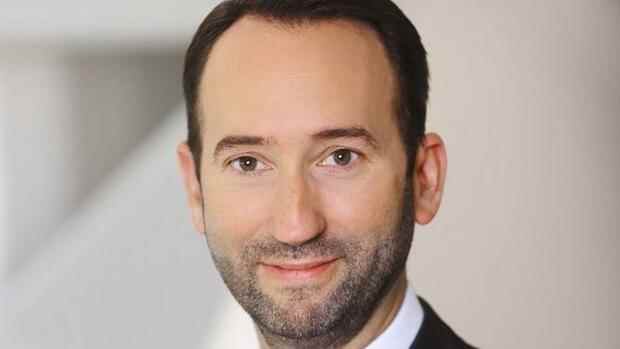The new NordLB boss wants to finance more renewable energies.
(Photo: East German Banking Association)
Frankfurt Jörg Frischholz could not have wished for a better start. After three years of losses and a rescue of billions, NordLB is back in the black – which Frischholz presented on Thursday as the new NordLB boss. The pre-tax result for 2021 was EUR 16 million.
The 45-year-old, who previously worked for private financial institutions for 26 years, has headed the Norddeutsche Landesbank since the beginning of the year. The positive development is not “window dressing”, i.e. no balance sheet cosmetics, for the new boss, emphasized Frischholz.
But positive news does make the start easier. After all, NordLB is not just any bank. Three years ago, the Hannoveraner Landesbank got into trouble in 2019 because of problematic ship loans. Shareholders such as the states of Lower Saxony and Saxony-Anhalt and the Sparkassen-Finanzgruppe put together a rescue package worth 3.6 billion euros, which was approved by the EU Commission at the end of 2019.
The bank is still in the process of being remodeled. A streamlining program was adopted at the same time. The balance sheet total has now shrunk to around 115 billion euros. The number of employees is to drop from 6,000 to 2,800 to 3,000 in two years. There are currently almost 4400 employees.
Top jobs of the day
Find the best jobs now and
be notified by email.
Profits are expected to be higher in 2022
Frischholz no longer has to deal with the earlier problem portfolio of ship loans. The volume has fallen from EUR 20 billion to EUR 700 million, and the remaining loans are secured. “In fact, we no longer have any ship exposure,” said Frischholz.
But that does not mean that the Landesbank is now automatically earning money. For the NordLB boss, the main thing now is that NordLB actually becomes sustainably profitable. One wants to continue to work on the transformation program with a high degree of discipline, said Frischholz.
Fresh wood is a team player, but demands, says someone who knows him well. In view of his age, Frischholz could spread a “spirit of optimism” at NordLB. If the conversion is successful, he could also be recommended for other tasks in the German banking industry.
For this year, Frischholz also expects a profit that should even be significantly higher than the result for 2021 – even if the consequences of Russia’s war against Ukraine make the specific forecast more difficult. The aim is to make NordLB a “very profitable state bank”.
Among other things, NordLB wants to increasingly finance renewable energies. Bank sees itself as one of the leading financiers in this field. The German banking market is still very competitive – both with regard to project financing and in the classic corporate customer business.
Frischholz’ change surprised many
It was a surprise that Frischholz switched to the NordLB management committee at all. In June of last year it became known that the NordLB owners – the majority of which belong to the state of Lower Saxony and since the support campaign to the nationwide savings banks – are bringing in Frischholz as the new head of the bank. Frischholz was only promoted to the Management Board of Hypo-Vereinsbank in 2020, where he was responsible for business with private customers.
He was a “strong leader with a clear track record within Hypo-Vereinsbank”, praised HVB Management Board Spokesman Michael Diederich Frischholz in April 2020 when he was promoted to the Management Board.
All in all, Frischholz, who studied business administration in Essen and in Vlissingen in the Netherlands, worked for private banks for 26 years – first for Dresdner Bank and Commerzbank. In 2015 he moved to HVB, which belongs to the major Italian bank Unicredit.
For NordLB, the 2021 profit marks a turning point. But it still lags far behind the three other large state banks, which earn a lot more. The largest state bank, LBBW in Stuttgart, brought in a pre-tax result of 817 million euros. She had earned more before the outbreak of the financial crisis.
BayernLB earned EUR 816 million before taxes. 45 percent of the profit came from its online subsidiary DKB. Frankfurt-based Helaba’s pre-tax profit was EUR 569 million.
More: BayernLB subsidiary DKB completes a U-turn at VTB Europe.
